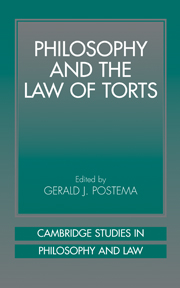Book contents
- Frontmatter
- Contents
- Contributors
- 1 Introduction: Search for an Explanatory Theory of Torts
- 2 A Social Contract Conception of the Tort Law of Accidents
- 3 Responsibility for Outcomes, Risk, and the Law of Torts
- 4 The Significance of Doing and Suffering
- 5 Tort Law and Tort Theory: Preliminary Reflections on Method
- 6 Corrective Justice in an Age of Mass Torts
- 7 Economics, Moral Philosophy, and the Positive Analysis of Tort Law
- 8 Pluralism in Tort and Accident Law: Towards a Reasonable Accommodation
- References
- Index
5 - Tort Law and Tort Theory: Preliminary Reflections on Method
Published online by Cambridge University Press: 01 July 2009
- Frontmatter
- Contents
- Contributors
- 1 Introduction: Search for an Explanatory Theory of Torts
- 2 A Social Contract Conception of the Tort Law of Accidents
- 3 Responsibility for Outcomes, Risk, and the Law of Torts
- 4 The Significance of Doing and Suffering
- 5 Tort Law and Tort Theory: Preliminary Reflections on Method
- 6 Corrective Justice in an Age of Mass Torts
- 7 Economics, Moral Philosophy, and the Positive Analysis of Tort Law
- 8 Pluralism in Tort and Accident Law: Towards a Reasonable Accommodation
- References
- Index
Summary
There is a familiar and clear, if not always clearly understood, distinction between explanation and justification. Explanations seek to illuminate, or to deepen our understanding, whereas justifications seek to defend or legitimate actions, rules, institutions, practices, and the like. This could invite the mistaken view that explanation is a descriptive activity, whereas justification is a normative one. In fact, both are norm-governed activities, regulated, however, by different kinds of norms. The norms that govern explanation are theoretical ones like simplicity, coherence, elegance, and consilience, whereas the norms that govern justification are moral – norms of justice, virtue, goodness, and so on.
Some legal theorists, like Ronald Dworkin and Stephen Perry, and especially the natural lawyers, believe that in the case of law, the projects of explanation and justification are deeply interdependent: that we cannot explain the concept of law without invoking at least some moral norms. While I disagree, this does not mean I believe that a philosophical explanation of the concept of law need not answer to norms of any sort. The debate may be framed in terms of the distinction between the following two kinds of claims: (1) Our concept of X depends in part on what our concept of X should be; (2) our concept of X depends in part on what X should be. My view is that our concept of law depends on what that concept should be; it must, in other words, answer to theoretical norms.
- Type
- Chapter
- Information
- Philosophy and the Law of Torts , pp. 183 - 213Publisher: Cambridge University PressPrint publication year: 2001
- 12
- Cited by

